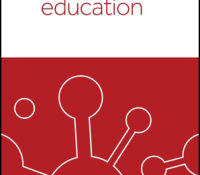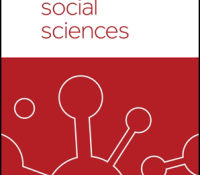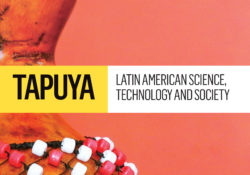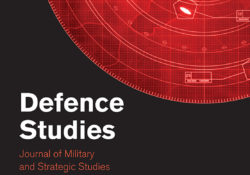tandfonline.com har udgivet en rapport under søgningen “Teacher Education Mathematics”: ABSTRACT ABSTRACT Asking questions is an important way of acquiring information and knowledge and plays a significant role in a child’s learning processes. In this study, we examine what characterises the questions asked by children to their teachers in two kindergartens (4–6-year-olds) and six primary school classes (2nd–4th grade) when situated in a natural outdoor environment. Recordings are undertaken by means of action cameras and audio recorders. We also examine the contexts in which the questions are asked. We found that whereas the preschool children’s science topic questions mostly concerned subject matter (74–95%), the schoolchildren more often asked practical questions. Our findings indicate that providing the children with activities that open for the children’s own explorations of a variety of… Continue Reading →
Like this:
Like Loading...
tandfonline.com har udgivet en rapport under søgningen “Teacher Education Mathematics”: ABSTRACT ABSTRACT This article explores the aims, strategies, developments, successes, and challenges of Gendered Innovations from its inception in 2005 to today. Gendered Innovations employs methods of sex, gender, and intersectional analysis to overcome past bias and, importantly, to create new knowledge. It seeks to harness the creative power of sex, gender, and intersectional analysis for innovation and discovery. The operative question is: does considering these factors add valuable dimensions to research? Do they take research in new directions? Gendered Innovations: (1) develops practical methods of sex, gender, and intersectional analysis specifically for natural scientists and engineers; and (2) provides case studies as concrete illustrations of how sex, gender, and intersectional analysis leads to discovery. The article discusses where Gendered… Continue Reading →
Like this:
Like Loading...
eric.ed.gov har udgivet: This study provides a comprehensive look at a constructivist one-to-one computing program’s effects on teaching and learning practices as well as student learning achievements. The study participants were 476 fourth and fifth grade students and their teachers from four elementary schools from a school district in the Dallas, Texas, area. Findings indicated consistent and highly positive findings of the efficacy of a constructivist one-to-one computing program in terms of student math and reading achievement, differentiation in teaching and learning, higher student attendance, and decreased disciplinary actions, suggesting a range of possible educational benefits that can be achieved through a comprehensive one-to-one computing educational environment. (Contains 3 tables.) Link til kilde
Like this:
Like Loading...
tandfonline.com har udgivet en rapport under søgningen “Teacher Education Mathematics”: Abstract Abstract This paper explores relationships between environment and education after the Covid-19 pandemic through the lens of philosophy of education in a new key developed by Michael Peters and the Philosophy of Education Society of Australasia (PESA). The paper is collectively written by 15 authors who responded to the question: Who remembers Greta Thunberg? Their answers are classified into four main themes and corresponding sections. The first section, ‘As we bake the earth, let’s try and bake it from scratch’, gathers wider philosophical considerations about the intersection between environment, education, and the pandemic. The second section, ‘Bump in the road or a catalyst for structural change?’, looks more closely into issues pertaining to education. The third section, ‘If you… Continue Reading →
Like this:
Like Loading...
tandfonline.com har udgivet en rapport under søgningen “Teacher Education Mathematics”: ABSTRACT ABSTRACT The theoretical framework of complexity is beginning to attract wider attention in research on the armed forces, and consequently the views of those who face complexity on the ground should be explored in more detail. Failure to do so risks complexity remaining only a top-level theory lacking adequate connection to practice. This article seeks to address this issue through analyzing the views of Finnish military officers. Data for the research were gathered using a deliberation and data collection method called a security café. A total of 74 people, most of them holding the rank of captain in the army or air force or lieutenant senior grade in the navy, attended the security café. The data used in this… Continue Reading →
Like this:
Like Loading...
eric.ed.gov har udgivet: To understand learners’ appropriation of technological tools and geometrical understanding, we draw on the theory of instrumental genesis (Lonchamp, 2012; Rabardel & Beguin, 2005), which seeks to explain how learners accomplish tasks interacting with tools. To appropriate a tool, learners develop their own knowledge of how to use it, which turns the tool into an instrument that mediates an activity between learners and a task. The tool used in our study is the Virtual Math Teams with GeoGebra (VMTwG) environment. It contains a chat panel and multiuser version of GeoGebra. The learners are seven middle and high school mathematics teachers who participated in a professional development course in which they collaborated synchronously in VMTwG to solve geometrical tasks. We use conventional content analysis to analyze the work… Continue Reading →
Like this:
Like Loading...
tandfonline.com har udgivet en rapport under søgningen “Teacher Education Mathematics”: Link til kilde
Like this:
Like Loading...
eric.ed.gov har udgivet: The Early Childhood Environment Rating Scale-Third Edition (ECERS-3) is the latest version of one of the most widely used observational tools for assessing the quality of classrooms serving preschool-aged children. This study was the first assessment of its factor structure and validity, an important step given its widespread use. An ECERS-3 observation was conducted in 1063 preschool classrooms in three states. In a subset of those classrooms (n = 119), Classroom Assessment Scoring System-Pre-K (CLASS Pre-K) and child assessment data were also collected. Analyses of the ECERS-3 suggested that a single factor does not adequately capture item variability. Of the solutions tested, the four-factor (Learning Opportunities, Gross Motor, Teacher Interactions, and Math Supports) provided the best combination of statistical support and theoretical utility. In general, the ECERS-3… Continue Reading →
Like this:
Like Loading...

tandfonline.com har udgivet en rapport under søgningen “Teacher Education Mathematics”: Abstract Abstract This study aimed to investigate the impact of a flipped classroom on the self-regulated learning (SRL) and academic achievement of seventh-grade junior high school students. A quantitative approach was used to compare the traditional and flipped classroom approaches. The data were obtained using the Motivated Strategies for Learning Questionnaire (MSLQ) along with students achievement scores. Cognitive learning strategies and metacognitive self-regulation strategies were investigated as indicators of students SRL strategies. The results indicated that 64 seventh-grade participants demonstrated a good-to-high level of practicing SRL within the flipped classroom environment. Moreover, the student participants appeared to self-regulate their metacognitive learning strategies in the flipped classroom environment more than those in the traditional learning environment. In terms of their academic… Continue Reading →
Like this:
Like Loading...

tandfonline.com har udgivet en rapport under søgningen “Teacher Education Mathematics”: Abstract Abstract This study explored the work environment factors that support or constrain the application of teacher professional development initiatives in Ghanaian basic schools. Utilizing qualitative research paradigm, 15 teachers were purposively selected and interviewed from one educational district in Ghana. Findings from the study showed that headteachers support through the provision of the required teaching and learning resources, peer support through culture of shared norms, beliefs and values and the opportunity to share knowledge during school-based in-service training (INSET), interest and commitment shown by students toward learning, and availability of needed teaching and learning materials supported transfer of learning of teachers. In contrast, lack of time due to rigid and inflexible school timetable, teacher workload, and inadequate teaching and… Continue Reading →
Like this:
Like Loading...






